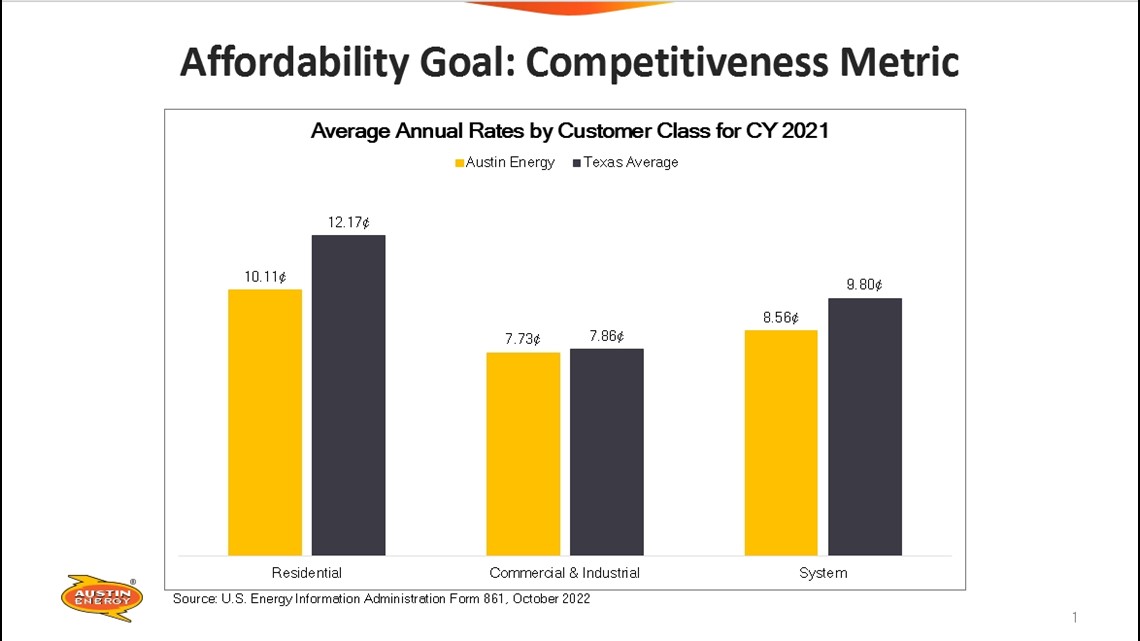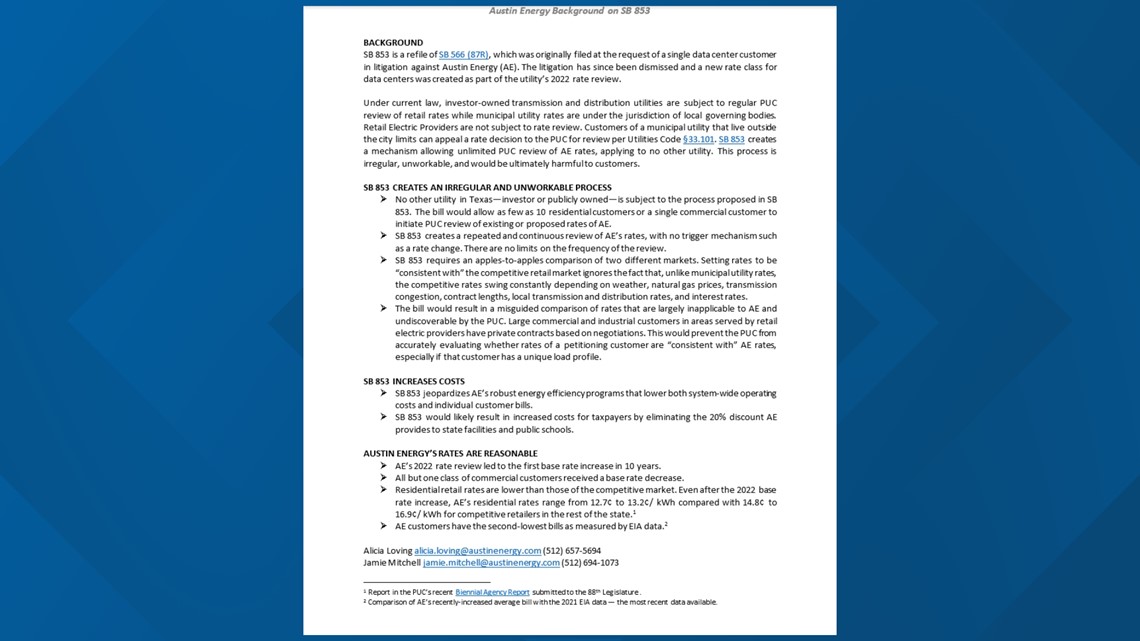AUSTIN, Texas — A new bill introduced to the Texas Legislature would give Austin Energy ratepayers the ability to ask the Public Utility Commission of Texas (PUC) to review their rates.
Austin Energy is the municipally owned utility that serves Austin, including the Capitol. It has its rates set by the Austin City Council. Residents within city limits cannot currently have their rates reviewed by the PUC – a power Texans in de-regulated areas have.
Senate Bill 853, filed by State Sen. Kelly Hancock, would create an equilibrium for all rate reviewal by the PUC.
"While other municipalities operate their utility services in the same manner, Austin Energy services the Capitol Complex area and the State should have the ability to review rates that are set to state agencies," the bill analysis shows.
SB 853 would allow residents to file a petition for the PUC to review current or proposed rates of any municipally owned utility that applies to the petitioner if they have a "non-demand metered total usage of more than 100,000 kilowatt hours per year or is serviced through a demand meter at a secondary or primary voltage."
Additionally, residents can't petition for utilities that do not apply to them.
Once a petition is filed, the bill would require the PUC to initiate a review no later than 90 days after filing to determine if the rates are consistent with other areas of the State that "have access to customer choice." If the PUC determines the rates of the municipally owned utility are consistent with the rates to those that have customer choice, the petition would be denied.
Under SB 853, if the PUC doesn't deny the petition no later than the 90 days after filing the petition, the municipally owned utility would be required to file a rate application with the PUC. This application would be compiled with "all the material respects with the rules and forms prescribed by the PUC" and would allow the PUC to extend the deadline for filing rate applications.
Lastly, the bill would require the PUC to conduct a full review of the rates applicable to the petitioner to determine if the rates are reasonable and do not lack consistency between the petitioner and other areas of the State with access to customer choice.
"There are a lot of differences between the cost of service for municipally owned utility and in a private utility," Thomas Gleeson, PUC's executive director, said.
Gleeson said the PUC does not have access to bilateral contracts with commercial and industrial customers.
"We'd have to work with those companies too, to see if we could gain access to that, absent any change in law," Gleeson said.
Data provided from Austin Energy to the Senate Committee on Business & Commerce shows Austin Energy has a lower average annual rate by all customer classes for calendar year 2021.


Last year, Austin Energy changed it base rates. Those rates now begin at 4.1 cents per kilowatt hour and include a customer charge of $13.
"We follow a process very similar to what would happen before the Public Utility Commission. We do a cost-of-service study. We hire an impartial hearing examiner. We have an independent consumer advocate. Anyone, any customer, can intervene. This last time we had 500 questions, we had 20 hours of testimony with 14 interveners, and we had a report by an impartial hearing hearings," Mark Dombroski, deputy general manager and chief financial and administrative officer at Austin Energy, said in a Senate committee on business and commerce on Tuesday.
"We were a participant in the rate case both in 2016 and in 2022. It was a long, laborious process. We hired expert witnesses, we spent money. We didn't like Austin Energy's proposed rates, so we entered into the rate case. But it was a fair process before an independent hearings examiner. We went through the whole process. There was essentially a negotiation at the end that lowered Austin Energy's original ask and also lowered the customer fee, which they were planning to put on residential customers. And we feel like, while we weren't enamored of the rate increase we felt like it was a fair process," Cyrus Reed, conservation director for the Lone Star chapter of the Sierra Club, said in Tuesday's hearing.
Dombroski said Austin Energy would expect to spend millions to undergo a PUC rate review. Those costs would be passed on to ratepayers, he said.
"I think there could be a role for the PUC in just saying, 'Here are some best practices that utilities could follow in terms of rate making, in terms of how much goes back to the general revenue,'" Reed said.
Austin Energy sends a portion of its revenue to the City of Austin for General Fund use.
"The General Fund transfer shall not exceed 12% of Austin Energy three-year average revenues less power supply costs and on-site energy resource revenue, calculated using the current year estimate and the previous two years’ actual revenues less power supply costs and on-site energy resource revenue from the City's Annual Comprehensive Financial Report," city budget records show.


If SB 853 gets out of committee hearings and eventually passed into law, it would take effect on Sept. 1.

